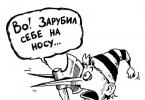Origin phraseological unit “cut on the nose” lost in distant centuries.
And, apparently, it it will remain a mystery , which you will want to solve.
Let's look at the meaning and versions of origin, synonyms and antonyms, as well as sentences with phraseological units from the works of writers.
The meaning of phraseology
Nick down - remember firmly, forever; take into account for the future
Phraseologisms-synonyms: notch it on your forehead, notch it in your head, tie a knot, wrap it around your mustache, take note
Phraseologisms-antonyms: get out of your head, listen with half an ear (partially)
In foreign languages there are expressions with similar meanings. Among them:
- put it into your pipe and smoke it (English)
- se mettre qch dans la tête (French)
- sich etw. hinter die Ohren schreiben (German)
Origin of phraseology
As is often the case, the overwhelming majority of articles and dictionaries present one single version of the origin of this phraseological unit, which states that it has nothing to do with the human nose. In principle, this is a completely normal situation, but this is what confused me: the main phraseological units-synonyms just refer to various parts of the body (notch (oneself) on the forehead, notch (oneself) in the head, wrap oneself around one’s mustache).
Of course, it’s nice to put forward an alternative version yourself, justifying it with a fairly obvious argument, but I wanted to find it in some authoritative source. And I found it. But let's look at each version in order:
- According to the main version, under the nose in the expression “notch on the nose” meant a “memorable tablet” for notching. And the word itself comes from the word “to carry,” since they were usually carried with them as a reminder of business and mutual obligations. It is believed that for the almost completely illiterate population of old Russia, such tablets with notches were the simplest substitute for writing. And in the case of recording a debt, the tablet was split and one half was given to the debtor so that he would remember his debt. This kind of practice, when a whole object was divided into two halves (given to the two parties to the agreement), which then had to be evenly joined to confirm mutual rights, was already used in ancient civilizations. And the main thing here was not the replacement of writing, but the high degree of protection of such “agreements” from forgery.
- In turn, V. Makienko in his work “Do we speak Russian correctly? Sayings. What do we know about them, where did they come from, how to understand and use them correctly” casts doubt on the above version. At the same time, he refers to the presence of phraseological units synonymous with other parts of the body both in Russian (see above) and in a number of European languages (for example, the literal meaning of the above German expression “sich etw. hinter die Ohren schreiben” - write that something behind the ears). Thus, he insists on the origin of the phraseological unit “notch on the nose” from the ordinary human nose. So that this version does not look too bloody (we don’t take Pinocchio into account), it should be clarified that the meaning of the verb to hack is not limited to “to make a notch”, but can also be interpreted as “to take note, remember forever” (Encyclopedic Dictionary, 2009). An argument can be made in favor of this version that making a mark on your body is the most reliable way to preserve it (the tablet can be lost or stolen). It is not without reason that even today, absent-minded people prefer to write down important information for memorization in the palm of their hand.
Examples from the works of writers
In fact, it turns out to be a perfect Box. Once you’ve got something in your head, you can’t overpower it with anything. (N.V. Gogol, “Dead Souls”)
You should have listened to this man with your mouth open, so as not to let out a word, but his words would have been cut off on his nose, and you are arguing! (A.N. Ostrovsky, “Profitable Place”) - by the way, quotes from Alexander Ostrovsky
Yes, it’s true, we entered not humbly, not as your hangers-on and seekers, but with our heads raised, as free people, and not at all with a request, but with a free and proud demand (you hear, not with a request, but a demand, kill yourself this !). (F.M. Dostoevsky, “The Idiot”)
You, Efim, kill yourself on the nose, and tell everyone here - if I hear any obscene word about her - a log on the head! (M. Gorky, “Foma Gordeev”)
By God, at twenty-two you are still just a boy. Or vice versa - an old man, a prude. That's right, prude. Don’t you understand that my relationship with Nikolai Ivanovich is built on something completely different? I consider him, considered him and will always consider him the best person on earth, put it on your nose. Is this clear to you or not? (V.P. Nekrasov, “Kira Georgievna”)
Hack on the nose Simple. Express Remember firmly, forever. - Now is not the time to remember that you were a teacher. For me, you are first and foremost a fighter. And only a fighter. Get it on your nose(P. Pustyntsev. Through the lead blizzard).
Phraseological dictionary of the Russian literary language. - M.: Astrel, AST. A. I. Fedorov. 2008.
See what “Hack on the nose” is in other dictionaries:
Nick down- notch on the wall, notice, record in memory, record in memory, notch on your forehead, notch on your wall, take note, notch on your forehead, save in memory, remember, tie a knot for memory, remember, tie a knot,... ... Synonym dictionary
Nick down- Notch on the nose (forehead) Take note, remember forever... Dictionary of many expressions
Nick down- remember firmly, forever. Initially, the phrase meant a playful threat. The nose was also called a tag that was worn with oneself and on which notches were placed to record work, debts, etc.... Phraseology Guide
hack to death- ruble/, rub/that is; hacked; flax, a, o; St. see also hack, hack to death, hack to death 1) someone to kill with a chopping instrument, weapon (axe, saber, saber) hack to death... Dictionary of many expressions
kill yourself on the nose- See remember... Dictionary of Russian synonyms and similar expressions. under. ed. N. Abramova, M.: Russian dictionaries, 1999 ... Synonym dictionary
hack to death- Notch on your forehead or on your nose or on the wall (colloquial fam.) take into account for the future tense, remember well. Get it in your head that I won’t tolerate this anymore... Phraseological Dictionary of the Russian Language
HACK- HACK, I’ll hack, you’ll hack, absolutely. (to hack to death). 1. who what. Kill with a saber, saber, axe. “I will cut down your child, Katerina!” Gogol. 2. what. To make a notch on something (special). 3. what. Make a cut in something (forge). ❖ Get yourself some… Ushakov's Explanatory Dictionary
HACK- HACK, slaughter, kill; killed; Sovereign 1. whom (what). Kill with a saber, saber, axe. 2. what. Use a chopping tool to make a notch in whatever, on whatever. Z. log. Notch it on your nose or forehead (colloquial) and remember it firmly for the future. | imperfect hack,... ... Ozhegov's Explanatory Dictionary
Razg. Express The same as a href=”/dict/frazslov/article/2/3561.htm” to hack on your nose/a. And I would tell another cook to hang it on the wall, so that he wouldn’t waste his speeches there, where power needs to be used (Krylov. The Cat and...
Outdated Express The same as a href=”/dict/frazslov/article/2/3561.htm” to hack on your nose/a. In fact, it turns out to be a perfect Box. Once you have hacked something into your head, you can’t overpower it with anything (Gogol. Dead Souls). I… … Phraseological Dictionary of the Russian Literary Language
Books
- Story. Journey to Ancient Rus' (CDmp3), . Publishing house "ARDIS" presents a unique collection of audio plays for children. Easily, as if playing, children will immerse themselves in a bright and exciting world of knowledge. And they will be helped with this... Buy for 259 rubles
- Sharks of steel, Ovechkin Eduard Anatolyevich. From reviews of the book: “Ovechkin’s stories are most reminiscent of diary entries - that’s why they are valuable. The writer does not invent anything, he writes down what he sees around him. What we saw around us. when…
How did the well-known expressions of the Russian language appear?
We are used to using idioms and sayings to better express our thoughts. But sometimes it becomes strange: what kind of hedgehog understands everything and how can you hack something off your nose?
Bright Side I have collected a story of 15 expressions that will change your understanding of them.
Nick down
The expression takes root in the depths of centuries, at a time when the beginnings of writing already existed, but there was no paper yet. And so, in order to remember something important, people made notches on a special wooden tablet that they carried with them. This board was called the “nose”.
So “get it on your nose” just meant “make a note in your notebook.”
No brainer
In Soviet boarding schools for gifted children, teenagers were recruited who had two years left to study (classes A, B, C, D, D) or one year (classes E, G, I).
The students of the one-year stream were called “hedgehogs.” When they came to the boarding school, the “two-year students” were already ahead of them in the non-standard program, so at the beginning of the school year the expression “no brainer” was very relevant.

Shabby look
“Shabby” was the name given to the clothes of church servants, which they wore “at meals,” that is, simple clothes, and not elegant ones, which they wore for services.
Later, cheap cloth came into use, which was used on tablecloths, napkins and towels. This fabric, which was most often used by ordinary people, was named after the Zatrapezny merchant family, which owned the linen manufactory. Clothing made from this fabric received the same name - usually it is rough, simple clothing.

There is no truth in my feet
Now this is a harmless invitation to sit down, but before the expression even had a cruel meaning.
In ancient times in Rus', debtors were severely punished, beaten with iron rods on their bare legs, seeking repayment of the debt, i.e., “truth,” but such punishment could not force those who did not have money to repay the debt. This was called "pravezh".
According to another version, it was believed that the landowner, having discovered that something was missing, gathered the peasants and forced them to stand until the culprit was named.

Rub glasses
The expression has nothing to do with the glasses people wear. In the 19th century, gamblers resorted to a trick: during the game, using a special adhesive composition, they applied additional points (red or black marks) to the cards with powder, and if necessary, they could erase these points.
This is where the expression “to rub glasses” comes from, meaning “to present something in a favorable light” or simply “to deceive.”

Seven Fridays a week
Once upon a time, Friday was free from work and market day. Therefore, on this day it was customary to fulfill various trade obligations. On Friday, when they received the money, they gave their word of honor to deliver the ordered goods on the next market day. On Friday, when they received the goods, they promised to give money for it next week.
It was then that they began to talk about a person who breaks his promise over and over again.

There is nothing behind the soul
“Soul” was the name given to the depression between the collarbones, the dimple in the neck above the sternum, where, according to popular belief, the human soul was located. In the same place on the chest (behind the soul) wallets were worn.
Leave with your nose, stay with your nose
The fact is that the word “nose” in this expression does not mean part of the face at all. It is a noun derived from the verb “to carry.”
According to one version, this refers to the nose that the groom, according to ancient custom, presented to the bride’s parents (i.e. “gift”, “ransom”). If the groom was refused and the gift was rejected, then the groom was left with his nose.
According to another version, the word nose is used here in the meaning of “offering”, “bribe”. In this case, staying with the nose meant “leaving with an unaccepted offering; leave without agreement."
Big boss
The expression goes back to the speech of barge haulers, in which the most experienced and strong barge hauler, walking first in the strap, was called “bump”. Now a “big shot” or “important shot” is an influential person.

In the bag
It’s over, it’s decided, it’s settled, everything is in order, everything ended well.
Soft cloth hats were worn by officials who were called “solicitors.” The attorneys prepared documents for the court and “concocted” the case. And these officials had a habit of putting important documents in the lining of their hats so as not to lose them.
So it was believed that if the solicitor put the petition in the hat, it means that it will reach the court, they will consider it there, and the case will be decided.
There is also an opinion that the phraseological unit is connected by the habit of messengers to sew very important papers, “deeds”, as they were then called, into the lining of their hats. This was a relatively reliable way to avoid being robbed.
Enjoy Your Bath!
In Russian baths, the hottest place was almost under the ceiling, where there was a platform on which they steamed. Steam rose from hot stones doused with water. Those going to the bathhouse were wished for a light steam, that is, the kind of steam that quickly rises upward from the hot stones.
The meaning is connected with another version: in the baths, steam could be mixed with carbon monoxide, from which people often got burned. This steam, in contrast to light, good steam, was called heavy. Therefore, they wanted an easy steam.
Put your teeth on the shelf
This expression is associated not with false teeth, but with tools.
If you have work, then you will always have a piece of bread on the table. If there is no work, then put your teeth on the shelf and go hungry.

Indian summer
The origin is connected with that period in the life of the peasants when field work ended and women began to do household chores: they soaked flax, ruffled it, and weaved it.
According to another version, the combinations “Indian summer”, “Indian days”, “Indian cold” in the old days had a meaning based on the superstition that women could influence the weather. In addition, during this period, thin, light cobwebs fly across fields and forests, foreshadowing dry weather. This web is associated with barely noticeable gray strands of hair in women, and the time of warm and fine days is associated with her age, which precedes old age.

sit in the livers
In Rus', the liver was considered the reservoir of vital force. That is, “to sit in the liver” meant to poison life, to interfere with life.

Show where crayfish spend the winter
Many landowners loved to feast on fresh crayfish, but in winter it is very difficult to catch them: crayfish hide under snags, dig holes in the banks of a lake or river and spend the winter there.
Therefore, in winter, guilty peasants were sent to catch crayfish, who had to get them out of the icy water - this is where this threat came from.

Seventh water on jelly
This is what they say about a person who is such a distant relative of you that it is not even clear whether he is a relative.
If the jelly sits for a long time, it loses its taste and a layer of water appears on it. The seventh water is water that appears on jelly that has stood for a long time, which is why its taste no longer has anything in common with jelly. The numeral “seven” is used here purely symbolically, as in other Russian proverbs and sayings. Sometimes they use the “tenth water on jelly” option.
Image: B. Diodorov
Based on materials:
The Russian language includes many meanings that are perfectly understood by its native speakers, but puzzle foreigners. “Hack on the nose” is a bright one, the translation of which is difficult for linguists from other countries. The origin of the phraseological unit, as is typical for such expressions, has a simple and at the same time interesting explanation.
Hack on the nose: the meaning of the phrase
The catchphrase is so established that it is used unconsciously by native speakers. The phraseological phrase “to hack on your nose” comes to a person’s aid when he wants his interlocutor to remember his words forever. For example, this statement can be made by parents or teachers who are scolding. It is also used by adults who are quarreling with each other.
This phrase is one of the clear proofs of the emotional richness of the Russian language. The expression “get it on your nose” better conveys the speaker’s emotions and the importance of his words than a simple request to remember something. However, it does not at all contain a threat of physical harm, as it may seem to a foreigner trying to translate the statement literally.
Origin of phraseology
Oddly enough, the winged expression initially did not have any emotional connotation. It was completely unrelated to damage to the human body. By proposing to cut off the nose, the speaker did not mean the organ of smell, as one might think. This name among the people was acquired several centuries ago by tablets that served as a lifesaver for a person who was not trained in literacy.

How are these devices connected to one of the body parts? Absolutely no way, since their name comes from the verb “to wear.” Considering the importance of writing instruments, many residents of that time practically did not part with them. In fact, “notching on the nose” meant making notches on the “notepads-noses” that were always with you.
Why are “noses” needed?
Almost until the overthrow of the tsarist government, which took place in 1917, literacy remained a privilege of high society. Most of the Russian population did not even have basic writing skills. Serious gaps in education did not prevent people from actively participating in trade, which flourished in the country. New trading houses were constantly founded, fairs were launched, and caravans flourished. Transactions were made every minute and sometimes involved large sums.

The tablets, to which the phraseological phrase “cut on the nose” owes its existence, were invented to help illiterate traders. With their help, they recorded their own financial transactions in memory, making notches. The “notepad” was deciphered by counting the number of “sticks” created. This does not seem convenient, but it is worth remembering the lack of electronic gadgets among people in those days.
It is interesting that such devices were also widespread in medieval Europe, since there, too, the situation with the literacy of the population in those days was deplorable.
Emotional color
Why do people these days threaten their opponents, either playfully or seriously, when they ask to be hacked to death? The meaning acquired an emotional coloring in connection with the main purpose of the tablets, which successfully replaced modern notepads. They became a means for fixing debt obligations.

It is easy to give an example of recording such an operation on a commemorative tag. A man borrows three bags of flour from a friend. To remember the fact of the loan and repay it in a timely manner, three notches are made on the board. Partial repayment of the resulting debt was not excluded. In this case, the “notebook” was divided into parts between the partners, and half of the notches made were kept on each part.
Obviously, they can pose a certain threat to the debtor. Connected with this is the gradual acquisition of emotional overtones by harmless expressions.
Other phraseological units "with a nose"
There are other original catchphrases that seem to be or are actually related to the olfactory organ. Among them there are phraseological units that have a simple explanation, and expressions that were formed in a complex way. An example of a “light” stable phrase is the characteristic “with a gulkin’s nose”, meaning a small amount of something. By gooey nose the speaker means the beak of a pigeon, which is small in size.
The phrase “getting away with your nose” has as long a history as “cutting off your nose.” The proposal remains from the times when bribery flourished in the country. For example, it was difficult to hope for a positive resolution of one’s issue in court if a gift was not prepared for a government representative. Of course, such a gift was not called a bribe: it was designated as a nose, a bring. If a person is left with his nose, this indicates that his gift was refused. Consequently, achieving the goal seems unrealistic.
Many catchphrases from the past have been forgotten, but the phraseological unit “cut on the nose” continues to be actively used in the Russian language.
In the Russian language you can find such expressions and idioms that will baffle even a foreign professional linguist. People who try to learn the Russian language are generally shocked when they try to understand the meaning of many catchphrases. Not even every Russian can explain the meaning of a phraseological unit " Nick down".
In Russia, everyone is familiar with this expression and understands its meaning perfectly. For example, a mother, scolding her child, can say: “Nikolai, don’t ever do that again, get it on your nose.” And the baby fully understands that this is the last warning that cannot be violated, otherwise bad consequences will follow. Although the child is unlikely to understand the meaning of this phrase, he understands the emotional connotation of this expression.
The history of the expression “hack on the nose”
In general, unfortunately, literacy was not held in high esteem among our ancestors. Only after the October Revolution 1917 year, accomplished with the help of English and German intelligence, the process of not only electrifying the entire country, but also teaching all its citizens literacy began.However, in the dark ages of medieval Rus', only priests and nobles were literate, and not all of them. However, life in the country was seething and in full swing, trade caravans scurried between cities, fairs and trading houses opened everywhere. Merchants made deals and earned money.
Given the general illiteracy, it was necessary to somehow get out.
At that time, there were special tablets on which sticks (notches) were scratched.
For example, one merchant lends a man three skeins of fabric. He takes out a tablet and puts exactly three notches. Then, when the debt is gradually returned, the tablet is divided into parts. This is done in such a way that half of each notch remains on both sides.
Well, this is all clear, but many will have a question.
What does the nose have to do with it?
Researchers believe that we are not talking about a human organ, but about a derivative of the verb “to wear.” The tablets on which the notches were made were of great importance in ancient Rus', so most citizens carried them with them without leaving them for a minute. After all, it was their money.





